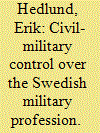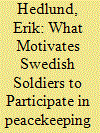| Srl | Item |
| 1 |
ID:
117625


|
|
|
|
|
| Publication |
2012.
|
| Summary/Abstract |
Civil-military relations and the autonomy of the military profession in Sweden have varied over time depending on the perceived level of external threats. In this article, we set out to conduct an analysis of Swedish civil-military relations over a period of more than twenty-five years from 1984 to 2011. Our analysis is made from the perspective of civil-military control of (1) the military officer rank system and (2) the professional officer education system, for all three services. The analysis is based on Samuel Huntington's and Morris Janowitz's theoretical discussion of "objective" and "subjective" civilian control over the military and will give answers on how the Swedish armed forces have been effected by objective and subjective civilian control during the late Cold War era and after the fall of the Berlin Wall in 1989. The findings of this study confirm the assumption that civil-military relations vary over time because of perceived external threats but also because of new threats, new tasks, and increased globalization and cooperation in multinational international operations.
|
|
|
|
|
|
|
|
|
|
|
|
|
|
|
|
| 2 |
ID:
165044


|
|
|
|
|
| Summary/Abstract |
After the end of the Cold War, many European countries cut back so heavily on defense expenditure that they lost their capacity to defend themselves. This resulted in greater need for improved cooperation and interoperability among member states’ armed forces. One important attempt to improve the understanding and interoperability among the European Union (EU) nation’s armed forces was taken in 2008 by the creation of the European Initiative for exchange of young officers aimed to make the officer education in Europe more transparent and convergent with each other. This article presents a proposal for a generic pedagogic model for an academically professional officer education that can improve understanding and interoperability among the EU nation’s armed forces. The model helps to facilitate a process of professionalization of the military profession with an officer education that can meet the requirements of higher education systems as well as the demands of the military profession.
|
|
|
|
|
|
|
|
|
|
|
|
|
|
|
|
| 3 |
ID:
099182


|
|
|
|
|
| Publication |
2010.
|
| Summary/Abstract |
Soldiers' self-images undoubtedly influence the way they recognize, perceive, plan and conduct their tasks. The article examines the self-image of Swedish peacekeepers in the UNMIL mission in Liberia and the UNMIK mission in Kosovo. The findings are based on interviews with 27 soldiers before, during and after deployment. Eleven dimensions of self-image were found, showing that the self-image refers almost entirely to the peacekeeping and not the war-fighting role. In addition, the Swedish soldiers hold themselves to be excellent peacekeepers. Departing from this observation, we discuss three dilemmas in peacekeeping that have implications beyond the Swedish armed forces. The argument is that being less self-referential may make peacekeeping more successful.
|
|
|
|
|
|
|
|
|
|
|
|
|
|
|
|
| 4 |
ID:
153624


|
|
|
|
|
| Summary/Abstract |
Cooperation in multinational military operations is one of the main tasks for the Swedish Armed Forces (SAF), which means that Swedish officers need to be able to meet international military staff standards. For this reason, the SAF and the Swedish Defence University organize an annual international staff exercise which aims to train officers in and increase their knowledge of North Atlantic Treaty Organization staff methods and procedures. The essence of successful staff work is good leadership and effective team work. In this article, we present findings from three staff exercises that have significant impact on leadership and possibilities for good team learning that relate to a team learning model. These findings have great potential to be of value in planning and improving leadership education and training in both military and civilian contexts.
|
|
|
|
|
|
|
|
|
|
|
|
|
|
|
|
| 5 |
ID:
101328


|
|
|
|
|
| Publication |
2011.
|
| Summary/Abstract |
During the last ten years, the Swedish Armed Forces has undergone a transformation in its shift toward worldwide peacekeeping operations. Subsequently, the Swedish government is moving away from conscription to an all-voluntary recruitment system. This transition may lead to substantial challenges in recruiting new soldiers for the Armed Forces as well as for peacekeeping operations. A key to successful recruitment is understanding what motivates young men and women to participate in peacekeeping operations. This research note addresses questions about what motivated Swedish peacekeeping soldiers to join the 5th mission to Liberia and the 14th mission to Kosovo in 2006. Fabrizio Battistelli's motivation typology, paleomodern, modern, and postmodern, is used in the analysis. The results show that all three motives were represented but that postmodern motives were by far the most common motivator.
|
|
|
|
|
|
|
|
|
|
|
|
|
|
|
|
| 6 |
ID:
101332


|
|
|
|
|
| Publication |
2011.
|
| Summary/Abstract |
During the last ten years, the Swedish Armed Forces has undergone a transformation in its shift toward worldwide peacekeeping operations. Subsequently, the Swedish government is moving away from conscription to an all-voluntary recruitment system. This transition may lead to substantial challenges in recruiting new soldiers for the Armed Forces as well as for peacekeeping operations. A key to successful recruitment is understanding what motivates young men and women to participate in peacekeeping operations. This research note addresses questions about what motivated Swedish peacekeeping soldiers to join the 5th mission to Liberia and the 14th mission to Kosovo in 2006. Fabrizio Battistelli's motivation typology, paleomodern, modern, and postmodern, is used in the analysis. The results show that all three motives were represented but that postmodern motives were by far the most common motivator.
|
|
|
|
|
|
|
|
|
|
|
|
|
|
|
|